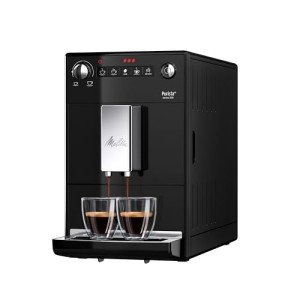Ten Easy Steps To Launch The Business Of Your Dream Home Espresso Machines Business
The Rise of Home Espresso Machines: A Comprehensive Guide
As coffee lovers continue to seek fresh and flavorful brews in the house, the appeal of home espresso machines has risen recently. No longer simply the domain of cafes and coffee bar, these machines empower people to craft barista-quality espresso beverages from the convenience of their kitchens. This post will check out the different types of home espresso machines, their features, and considerations for selecting the right one. Furthermore, it will supply a choice of FAQs to help potential purchasers make notified decisions.
Kinds Of Home Espresso Machines
Home espresso machines can be classified into several categories based upon their systems and user-friendliness. Each type has its unique features, pros, and cons.
Type
Description
Pros
Cons
Manual Espresso Machines
Needs the user to manually control the brewing process, including methods like pulling a lever to create pressure.
- Complete control over brewing procedure
- Compact style
- Requires ability and practice
- Time-consuming
Semi-Automatic Machines
Machine automates water circulation and pressure, but the user still manages the dosing and duration of the brewing process.
- Balance of automation and control
- Versatile
- Learning curve for improving techniques
Totally Automatic Machines
Automates the whole developing procedure, from grinding to brewing, frequently with programmable settings for personalized beverages.
- Extremely easy to use
- Quick and practical
- Less control over the brewing process
- Higher price point
Capsule or Pod Machines
Utilizes pre-packaged espresso pills or pods to produce coffee quickly and quickly.
- Extremely easy to use
- Minimal clean-up
- Limited flavor range
- More costly per cup than ground coffee
Super-Automatic Machines
Integrates functions of fully automatic machines with integrated grinders, allowing users to brew whole bean espresso and milk-based drinks with one touch.
- All-in-one benefit
- Ideal for milk-based drinks
- Often the most pricey
- Can be bulky
Functions to Consider
When selecting a home espresso machine, prospective purchasers should consider the following functions to guarantee they choose a machine that meets their requirements:
Grinder Type:
- Built-in grinders can supply fresher grounds but might need more upkeep.
- Different grinders permit more modification of grind size.
Pressure:
- Look for machines that produce a minimum of 9 bars of pressure, which is optimal for brewing espresso.
Water Temperature Control:
- Machines with adjustable temperature level settings permit for better extraction of taste from beans.
Milk Frothing Options:
- Consider whether you want a manual steam wand for frothing or an automatic milk frother for convenience.
Relieve of Cleaning:
- Machines with removable parts and self-cleaning functions substantially minimize cleanup time.
Size and Design:
- Ensure the machine fits conveniently in your kitchen and lines up with your visual preferences.
Budget:
- Set a budget before starting your search, as rates can range substantially from affordable models to high-end machines.
Benefits of Home Espresso Machines
Owning a home espresso machine offers numerous advantages:
- Cost-Effective: Over time, developing espresso in your home can conserve coffee enthusiasts cash compared to frequent café check outs.
- Modification: Users can explore various beans, grind sizes, and brewing methods to find their perfect cup.
- Convenience: The capability to brew espresso any time removes the need to head out to a café, specifically beneficial throughout late nights or mornings.
- Quality assurance: With a home machine, people have complete control over the quality of ingredients and developing procedures.
Drawbacks of Home Espresso Machines
Nevertheless, there are some downsides to consider:
- Initial Investment: High-quality espresso machines can be expensive, requiring a considerable in advance investment.
- Learning Curve: Mastering the art of espresso brewing can take some time and practice, which might be intimidating for newbies.
- Maintenance: Like any device, espresso machines need routine cleansing and upkeep to make sure ideal efficiency.
FAQs
1. What is the best kind of home espresso machine for novices?
Answer: For novices, a semi-automatic machine is frequently suggested as it offers a balance between control and automation, permitting you to find out the basics without frustrating intricacy.
2. How Espresso Machines Under £1000 should I spend on a home espresso machine?
Answer: Entry-level machines can start around ₤ 100 to ₤ 300, while higher-end models can range from ₤ 500 to over ₤ 2000. It's important to set a budget based on your expected use and wanted features.
3. Do I require a separate grinder?
Answer: While some espresso machines come with built-in mills, investing in a separate grinder permits greater personalization and guarantees much better quality grounds.
4. How typically should I clean my espresso machine?
Answer: Cleaning frequency can vary by machine type, however it's usually recommended to clean up the machine after each use and perform deep cleanings weekly or monthly, depending upon use.
5. Can I make milk-based beverages with any espresso machine?
Response: Not all machines come with milk frothing capabilities. If you take pleasure in beverages like lattes or coffees, search for a machine with a steam wand or automatic frother.
Home espresso machines are changing the method coffee connoisseurs enjoy their precious brews. With various types and advanced functions readily available in the market, there is something for everyone. Whether it's the joy of producing unique dishes or simply enjoying the ideal shot of espresso, buying a home espresso machine can boost both the coffee-drinking experience and the lifestyle for coffee lovers all over. As with any investment, it is essential to weigh the advantages versus the prospective downsides and choose a machine that flawlessly fits both your way of life and preferences.
